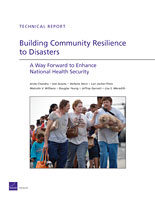You are here
Building Community Resilience to Disasters - A Way Forward to Enhance National Health Security
Primary tabs
Building Community Resilience to Disasters - A Way Forward to Enhance National Health Security
Sun, 2012-07-22 01:04 — Kathy Gilbeaux
rand.org
Community resilience, or the sustained ability of a community to withstand and recover from adversity has become a key policy issue at federal, state, and local levels, including in the National Health Security Strategy. Because resources are limited in the wake of an emergency, it is increasingly recognized that resilience is critical to a community's ability to reduce long recovery periods after an emergency. This report provides a roadmap for federal, state, and local leaders who are developing plans to enhance community resilience for health security threats and describes options for building community resilience in key areas. Based on findings from a literature review and a series of community and regional focus groups, the authors provide a definition of community resilience in the context of national health security and a set of eight levers and five core components for building resilience. They then describe suggested activities that communities are pursuing and may want to strengthen for community resilience, and they identify challenges to implementation.
- by Anita Chandra, Joie Acosta, Stefanie Stern, Lori Uscher-Pines, Malcolm Williams, Douglas Yeung, Jeffrey Garnett, Lisa S. Meredith

Recent Comments